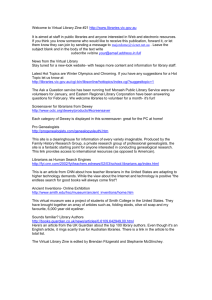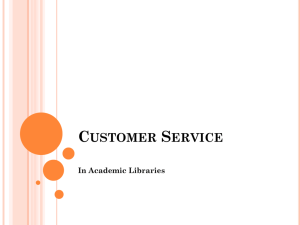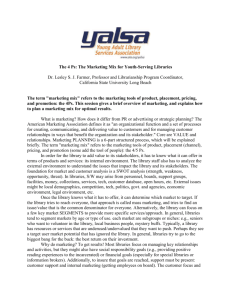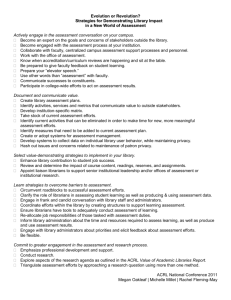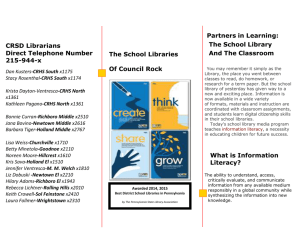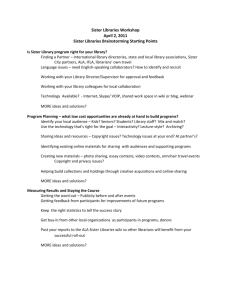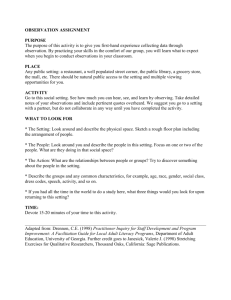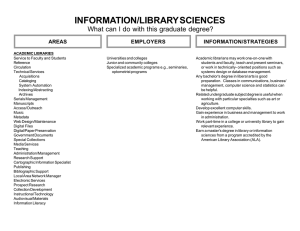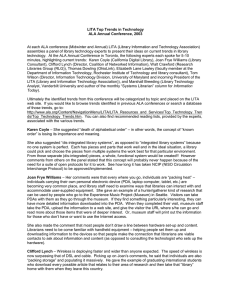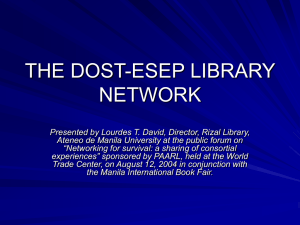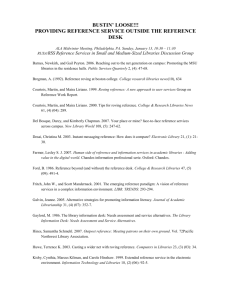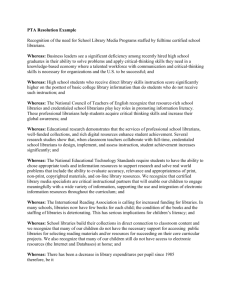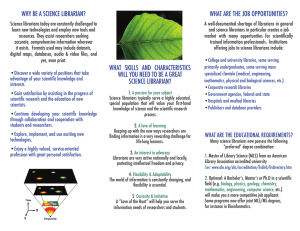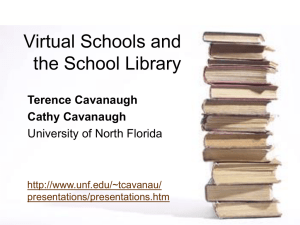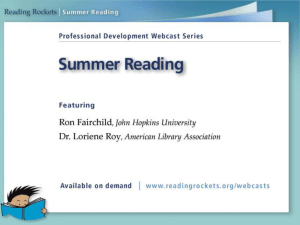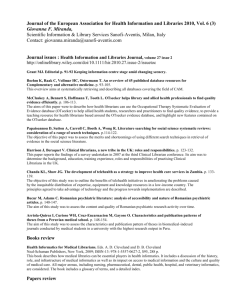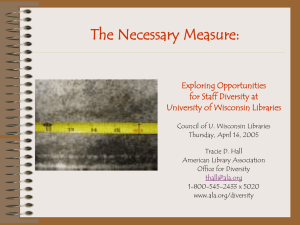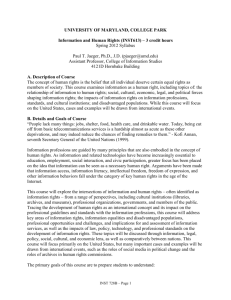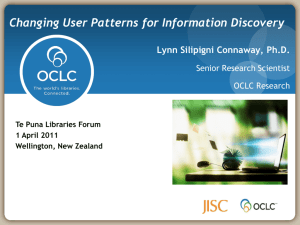LAMA/MAES - American Library Association
advertisement
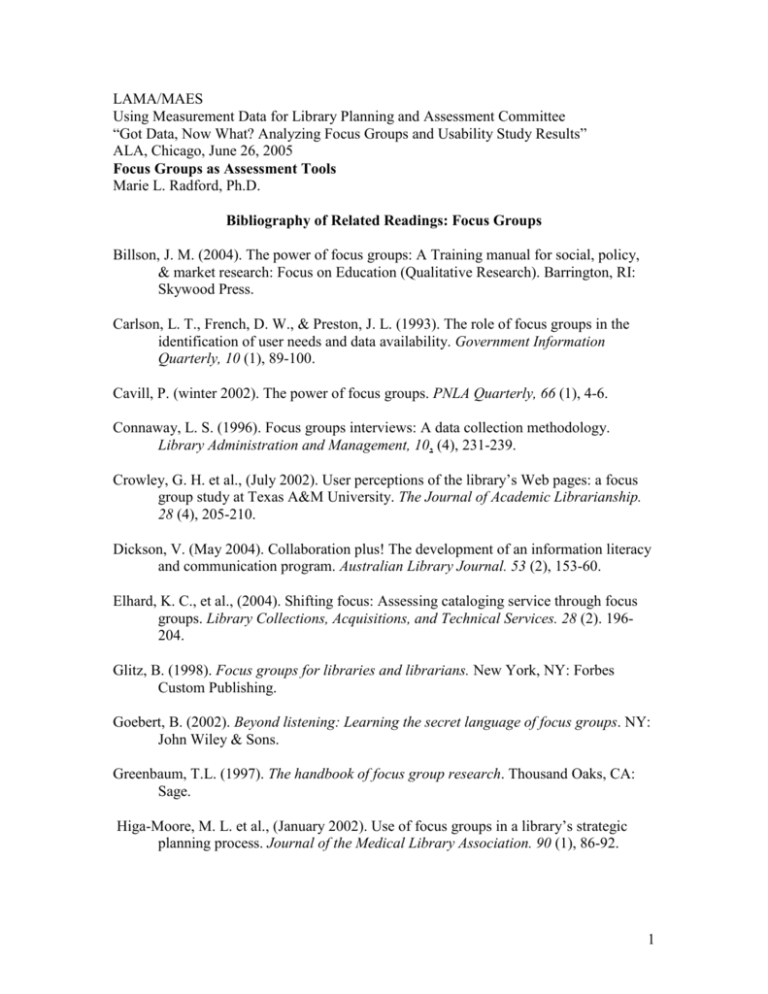
LAMA/MAES Using Measurement Data for Library Planning and Assessment Committee “Got Data, Now What? Analyzing Focus Groups and Usability Study Results” ALA, Chicago, June 26, 2005 Focus Groups as Assessment Tools Marie L. Radford, Ph.D. Bibliography of Related Readings: Focus Groups Billson, J. M. (2004). The power of focus groups: A Training manual for social, policy, & market research: Focus on Education (Qualitative Research). Barrington, RI: Skywood Press. Carlson, L. T., French, D. W., & Preston, J. L. (1993). The role of focus groups in the identification of user needs and data availability. Government Information Quarterly, 10 (1), 89-100. Cavill, P. (winter 2002). The power of focus groups. PNLA Quarterly, 66 (1), 4-6. Connaway, L. S. (1996). Focus groups interviews: A data collection methodology. Library Administration and Management, 10, (4), 231-239. Crowley, G. H. et al., (July 2002). User perceptions of the library’s Web pages: a focus group study at Texas A&M University. The Journal of Academic Librarianship. 28 (4), 205-210. Dickson, V. (May 2004). Collaboration plus! The development of an information literacy and communication program. Australian Library Journal. 53 (2), 153-60. Elhard, K. C., et al., (2004). Shifting focus: Assessing cataloging service through focus groups. Library Collections, Acquisitions, and Technical Services. 28 (2). 196204. Glitz, B. (1998). Focus groups for libraries and librarians. New York, NY: Forbes Custom Publishing. Goebert, B. (2002). Beyond listening: Learning the secret language of focus groups. NY: John Wiley & Sons. Greenbaum, T.L. (1997). The handbook of focus group research. Thousand Oaks, CA: Sage. Higa-Moore, M. L. et al., (January 2002). Use of focus groups in a library’s strategic planning process. Journal of the Medical Library Association. 90 (1), 86-92. 1 Krueger, R.A. (2000). Focus groups: A practical guide for applied research. (3rd ed.). Thousand Oaks, CA: Sage. Lederman, L. C. (1996). Asking questions and listening to answers: A guide to using individual, focus group, and debriefing interviews. Dubuque, Iowa: Kendall/Hunt. Leighton, H.V., et al. (2003). Web page design and successful use: A focus group study. Internet Reference Services Quarterly. 8 (3), 17-27. Hughes-Hassell, S. et al. (October 2004). Using focus group interviews to improve library services for youth. Teacher Librarian. 32 (1), 8-12. Morgan, D.L. (1997). Focus groups as qualitative research. (2nd ed.). Newbury Park, CA: Sage. Morrison, R. et al., (2004). Taking assessment on the road: Utah academic librarians focus on distance learners. Journal of Library Administration. 41 (1/2), 327-344. Norlin, E. (2000). Reference evaluation: a three-step approach – surveys, unobtrusive observations, and focus groups. College and Research Libraries, 61, (6), 546-553. Powell, R. R. and L. S. Connaway, Basic Research Methods for Librarians. (4th ed.). Littleton, CO: Libraries Unlimited, 2004. (See pages 150-155 and Chapter 7, “Qualitative Research Methods,” authored by Lynn Westbrook, pages 193-194). Rockwell, J. D. (2000). In the company of others: An introduction to communication. Mountain View, CA: Mayfield Publishing Co. Rose, P. M., Stoklosa, K., & Gray, S. A. (summer 1998). A focus group approach to assessing technostress at the reference desk. Reference & User Services Quarterly, 37(4), 311-317. Ross, C. S. & Dewdney, P. (1998). Communicating professionally: A how-to-do-it manual for library applications (2nd ed.). NY: Neal-Schuman Publishers, Inc. Seggern, M.V., et al. (2003). The focus group method in libraries: Issues relating to process and data analysis. Reference Services Review. 31 (3), 272-284. Shoaf, E.C. (March 2003). Using a professional moderator in library focus group research. College & Research Libraries. 64 (2), 124-132. Zweizig, D., Johnson, D.W., Robbins, J., & Bewsant, M. (1996). The Tell It! Manual. Chicago: ALA. 2


